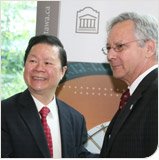
The SAC 2008 Report sounds the alarm at the U of O by suggesting that the institutional treatment of academic fraud cases appears to suffer from systemic racism. More than two thirds of the 48 students who consulted the centre on academic fraud charges in the report period were visible minorities (Arab, Asian, and black men and women).
.
The SAC 2008 Report also exposes bias in practice and attitudes among members of the institution’s relevant decisional bodies, such as with the Senate Appeals Committee which at the time of the
SAC 2007 Report still had the practice of refusing that its members be identified to the defendant students and their representatives.
.
To this day, the University of Ottawa does not post Senate committee memberships on its web site – this at “
Canada’s university” which claims in its
Vision 2010 strategic plan that “Collegiality, transparency and accountability are the principles that guide our university governance.”
.
The SAC 2008 Report attracted much radio, TV, and print media attention. This normally should have catalyzed a positive response, with the University launching a self-examination exercise in view of repairing the situation.
.
Instead, the Rock administration launched a campaign of deep denial.
.
At the November 17th Board of Governors meeting Allan Rock
stated “
I know enough about the work that’s been done to date to tell you that we’re going to disagree very strongly that there’s any evidence to support the allegations that have been made,” in reference to the University’s evaluation of the SAC report.
.
On November 24th VP-Academic and Provost
Robert Major referred to the University’s evaluation as a soon to be released “
public […] evaluation[,] by an independent assessor, of the report [of the SAC]”.
.
Students who would attempt to pass an internal report as an independent report would probably be accused of academic fraud but such intellectual dishonesty appears to be acceptable to the institution for a report denouncing a student association “allegation” of racism in treating academic fraud cases.
.
Rather than being an independent report, and far from being of professional caliber, the St. Lewis evaluation is prima facie intended to diffuse a media and public relations image management liability for the University. The University appears to be far more concerned with casting doubt on the conclusions of the SAC report than on an independent examination of the issue or on implementing any preventative measures.
.
The St. Lewis report has an unprofessional tone throughout. It states “very unprofessional” rather than “unprofessional”; “totally unsubstantiated” rather than “unsubstantiated”; “complete failure to” rather than “failure to”; “does not provide any assistance” rather than “does not provide enough assistance”; “clearly intended” instead of “intended”; etc. A language that is not characteristic of objectivity...
.
St. Lewis stressed that the SAC data on student complaints relates to only “1% of the total university population.” Many published medical clinical trials and studies are based on similar-size and smaller samples. You use what you have. If only 0.1% of students were murdered every year on campus would we wait for a statistically significant sample to perform a detailed correlations analysis of likely causes before sounding the alarm and seeking concrete remedies? Would the University put out a report criticizing the legitimacy of the data and the fact that error analysis was not performed? (The nature of the St. Lewis report suggests it might…)
.
More important are some gross elements of the St. Lewis report.
.
RELIEVING EXECUTIVE RESPONSIBILITY.
In arguing that University executives cannot and should not be asked to intervene in student appeal cases, St. Lewis confuses a system that is ideal when the individuals running it are ideal with the breakdown that occurs when the individuals act with racial prejudice and class bias. St. Lewis takes the position that the approved process cannot be sabotaged by discrimination, racism, and bias, and removes the legal responsibility of University executives to intervene in such circumstances of breakdown. Her position is the absurd one where the system works by definition such that the responsible executives cannot legitimately intervene. It appears that the responsible executives in question are happy to agree with St. Lewis.
.
EVIDENCE FOR SYSTEMIC RACISM.
Another gross element of the St. Lewis report actually substantiates the SAC conclusion of systemic racism. In her report St. Lewis writes: “The International Office currently provides international students with information regarding the academic expectations […] including our (sic) policy on plagiarism […] They are informed of the consequences of plagiarism […] It is a well known adage that ‘ignorance of the law is no excuse’.”
.
Such disregard for cultural differences regarding copyright etiquette and academic “norms” is in itself systemic racism, at an institution that prides itself in celebrating Canada’s multi-culturalism. St. Lewis’ position of the supremacy of western academic practice, while being insensitive to cultural diversity among international students, is a window into a root cause of the problem that the SAC has identified.
.
A rigid and zealous “academic fraud” program, incapable of critical self-examination is also paternalistic and at odds with some of the richest intellectual property movements in our globalized world: Copyright-alternative movements and the copyleft concept of participatory creativity.
.
MAIN RECOMMENDATION IS TO ACCESS SAC DATA….
Finally, to name only one of the many other major problems contained in the St. Lewis report, let us address its “principal recommendation that an independent assessment to evaluate the Academic Fraud files identified by the Student Appeal Centre be conducted […] to ensure that there is indeed no systemic racism in the Academic Fraud process.”
.
And restated as St. Lewis’ Recommendation 1: “That SAC cooperate with the University in allowing it to undertake an independent analysis of the Academic Fraud data […]”
.
We thinks it might be good for St. Lewis to define “independent” here… Let’s see… St. Lewis’ main recommendation is for the University to access and evaluate the SAC data that students have provided the SAC. Wow! And this would not “have a chilling effect on students’ willingness to pursue their legitimate claims” as St. Lewis suggests is the effect of the SAC Report?
.
So after all this, according to St. Lewis, the best thing to do now, since it’s obvious that there cannot possibly be systemic racism at “our” U of O, is to get that SAC data and shred it so it can’t hurt us any more. Brilliant.
.
I predict that St. Lewis is in line for a promotion to Associate Professor soon.
.
[Photo credit: University of Ottawa; Joanne St. Lewis]












